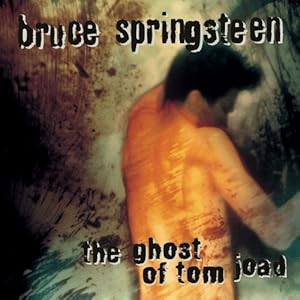The release of Human Touch and Lucky Town didn't really go over as planned. There was a lot of resentment about the sacking of The E-Street Band, and, as I have mentioned, the replacements didn't really provide anything other than a really good impression of the people they were replacing.
That's a comment that shouldn't really be taken as a criticism of anyone but, really, Springsteen, himself. The session musicians on those two albums do really impeccable work. They only pale when compared to a specter that's not of their own making. For example, Shane Fontayne's guitar work is fantastic, his skill is on par with Nils Lofgren, and way beyond Little Steven, but he's not them...and that's just something he had no way to get around, no matter how well he played.
During the break we also got a Live set with the "other band," and a really underwhelming greatest hits set. The Greatest Hits offered three new tracks with the E-Street Band, but only Murder, Incorporated really made an impact. This Hard Land was pretty nondescript, and really didn't offer any of the propulsion the band was capable of. Blood Brothers was nice, especially lyrically, but again felt strangely muted for a song that, ostensibly, celebrated a reunion with the team.
So, Springsteen, when he headed back into the studio, really ejected the "band" concept all together. The primary sound of The Ghost of Tom Joad, released November 21st, 1995, is Springsteen's voice and his acoustic guitar.
The title really tells it all, the album is rife with dust bowl imagery, and clearly it's Springsteen taking his shot at becoming a modern-day Woody Guthrie. That, on the surface is a really self-indulgent notion, but Springsteen managed to avoid the major traps by finding a modern subject matter than resonated and reflected Guthrie's dust bowl stories, but felt immediate and timely. That of the plight of immigrants, legal or otherwise, in America.
The tone is even more sparse and bleak than Nebraska, but Joad turns the subject matter outside, rather than in. It doesn't get much more bleak than the Mexican boy holding in his organs in place after being struck by a car in Balboa Park. Or the brothers caught in a Meth lab explosion during Sinaloa Cowboys.
It is with The Ghost of Tom Joad that we begin to see the nakedly political Springsteen. This is protest music, make no mistake, and it functions in that realm. It's not the most fun Springsteen album to listen to, it's "good for you, high fiber" stuff. I say that to be clear about what you get in this album, not to scare you off. There are tracks on this record that are beloved to me. The Line is an amazing work of storytelling, one that has haunted me with the idea of a stage adaptation since I really sat down and listened to it.
Storytelling is the main thrust here, narratives abound, and that is why the politics work in this case. Bruce goes to great pains to make the politics personal, and it is riveting stuff. When he sings of the ex-con struggling to walk the straight and narrow path in Straight Time, you feel for him because Bruce has gone to great pains to get inside the man's head. When, in the final lines, he saws off a shotgun, you feel the sting of that failure, because the lines before, and the music, have made it clear it's the end of a long struggle. A struggle that has ended in failure, no matter what the result of the impending crime.
These are not "catchy" tunes, in the main. They tend to build a tapestry of the events that Springsteen is conveying, the point is not to get you dancing, or tapping your feet. That said, the album does end on a moment of levity and fun with My Best was Never Good Enough. The title track also offers a pretty catchy chorus, while building a deep mood of desperation. So, it's not all downer here, but be prepared.
The Ghost of Tom Joad is a personal favorite, if I get right down to it. I actually listen to these songs more than the Nebraska tracks. There's something about the simple, sparse arrangements and the involving stories that really sucks me into the place where Springsteen was with this material. The production, by Springsteen and Chick Plotkin, really serves up Bruce effectively in this acoustic troubadour milieu. The album sounds great, like you're sitting in a living room listening to Bruce play.
The short, solo acoustic tour that followed this album because somewhat infamous. Not only for the scarcity of tickets, but for Springsteen's chastising some audiences who were in the mood for a louder, more raucous show. After the fact, Bruce has commented that he felt that, with this record, he had left rock and roll behind. He even worried that, when the E-Street Band reunion tour finally happened in the late 90's, that he would no longer be able to sing rock.
Clearly, that wasn't an issue.

No comments:
Post a Comment